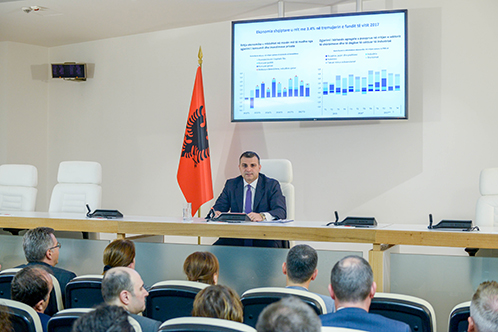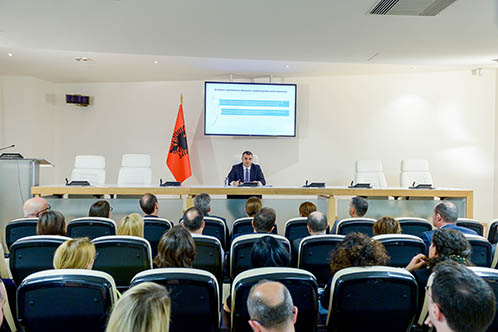BANK OF ALBANIA
PRESS RELEASE
Governor Sejko: Statement to the Press Conference on the Monetary Policy Decision of the Supervisory Council of the Bank of Albania
Publication date: 02.05.2018
In today’s meeting, the Supervisory Council of the Bank of Albania reviewed and approved the Quarterly Monetary Policy Report. Based on our monetary and economic analysis, the Supervisory Council discussed about their outlook. The Supervisory Council concluded that the current monetary policy stance remains adequate and decided to keep the policy rate unchanged.
Let me now explain our conclusions and our monetary policy decision in greater detail.

The new information analysed in this Report suggests that the Albanian economy continues to maintain a positive development trend. Economic activity continues to expand and inflation has been upward, whereas monetary and financial conditions remain overall adequate for achieving our inflation target, in the medium-term horizon.
Inflation averaged 1.9% in the first quarter of 2018, registering a slight increase from the previous quarter. This increase reflected mainly higher rent price inflation, whereas food prices continued to be volatile and the inflation of the other items of the basket remained relatively low and stable.
From a broader perspective, the increase in inflation was favoured by the expansion of aggregate demand and domestic inflationary pressures; yet, it continued to decelerate, owing to low inflation in trading partners and strengthening of the exchange rate appreciation.
According to INSTAT data, the Albanian economy grew 3.4% in the last quarter of the previous year. Indirect available data suggest that a similar growth pace has been maintained also in the first quarter of the current year.
Economic activity expanded driven, to a large extent, by the increase in consumer spending and private investments. Conversely, the fiscal stimulus reduced during the period, whereas the international trade deficit expanded. The expansion of aggregate demand was reflected mainly in growth in the services sector and in certain branches of the industry sector.
In macroeconomic terms, growth was supported also by the improved confidence of the private sector, upswing in external demand and high levels of foreign direct investments, as well as the favourable financing conditions at home.

The expansion of the economic activity has led to a better utilisation of production capacities. It is reflected in the further increase in employment, fall in the unemployment rate, and improvement of balance sheets of Albanian enterprises. But, economic activity in Albania remains below its potential, which impedes the rise in wages and production costs.
The accommodative monetary policy implemented by the Bank of Albania has been and remains an important factor for supporting Albania’s development. In response to this policy stance, financial markets continue to be characterised by low interest rates, adequate liquidity situation and reduced risk premiums.
The banking sector continues to record adequate and improving indicators on asset quality, liquidity, profitability and capitalisation. Credit to the economy grew 3.3% on average, during the first quarter of the year, fuelled, to a large extent, by the 7% growth in the lek loans portfolio. The Bank of Albania finds that the expected increase in the need for financing should be accompanied by more realistic and flexible lending policies by the banking sector, so as not to condition the development dynamics in the future.
A notable development in the financial markets was the appreciating trend of the exchange rate.
In relation to this phenomenon and in line with our previous stance, the Bank of Albania deems that the medium-term trend of the exchange rate, which started in the second half of 2015, reflects the action of fundamental factors. These factors materialised in an increased foreign currency supply, as a result of the improvement in the current account deficit, high levels of foreign direct investments, and reduction of risk premia in the domestic financial market.
On the other hand, the relatively rapid appreciation of the exchange rate in the past two months has reflected the action of specific factors in the foreign exchange market. This performance reflects neither direct effects nor the objectives of our strategy for promoting the use of the national currency. As such, it is expected and estimated to be short term.
In accordance with the identified trends and our conclusions on determinant factors of development, the update of our medium-term forecasts reconfirmed our previous expectations. The Albanian economy is expected to continue to grow in the medium-term horizon, on the back of stimulating financing conditions and the expected improvement in the external environment. The increasingly higher utilisation of production capacities will create the premises for domestic inflationary pressures to strengthen, bringing them in line with our inflation target. The strengthening of these pressures is expected to be adequate for offsetting the rapid and temporary appreciation of the exchange rate.
In line with these assessments, the Bank of Albania expects inflation to stabilise around the present level during 2018 and gradually increase in 2019. Our projections show that inflation will converge toward our target within the next year.
***
Judging on the above, the Supervisory Council decided to
- Keep the policy rate unchanged at 1.25%;
- Keep the overnight deposit and overnight lending rates at 0.25% and 2.25%, respectively.
In comparison to our previous assessments, the Supervisory Council judges that convergence of inflation to target will require a more accommodative monetary policy stance in the medium term. Based on the available information, the Supervisory Council deems that the intensity of the monetary stimulus will not diminish before the second quarter of 2019.
In addition, the Supervisory Council judges that the balance of risks to inflation has shifted further to the downside. Against this backdrop, should the intensity and duration of decelerating factors for the return of inflation to target be stronger than our current estimations, the Bank of Albania stands ready to respond, through available instruments and in accordance with the monetary policy regime.

 Twitter
Twitter
 Youtube
Youtube
 Facebook
Facebook
 Flickr
Flickr
 RSS
RSS
 Subscribe
Subscribe
 Feedback
Feedback